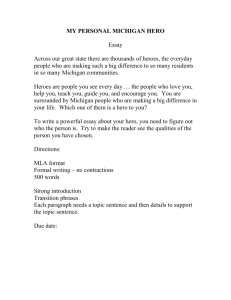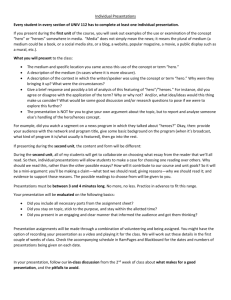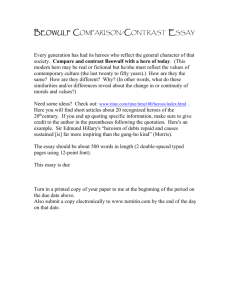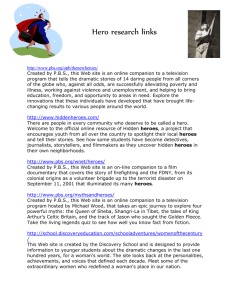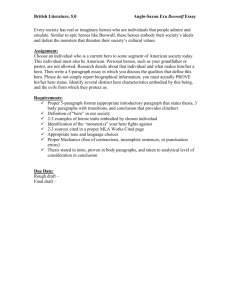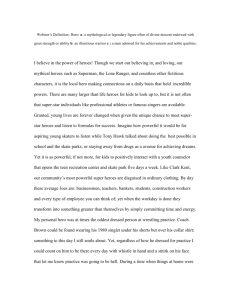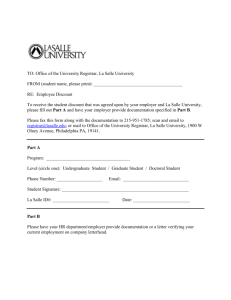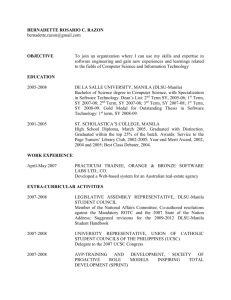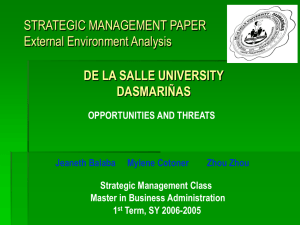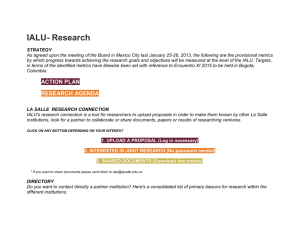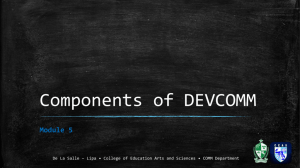The Noble Profession of Teaching
advertisement
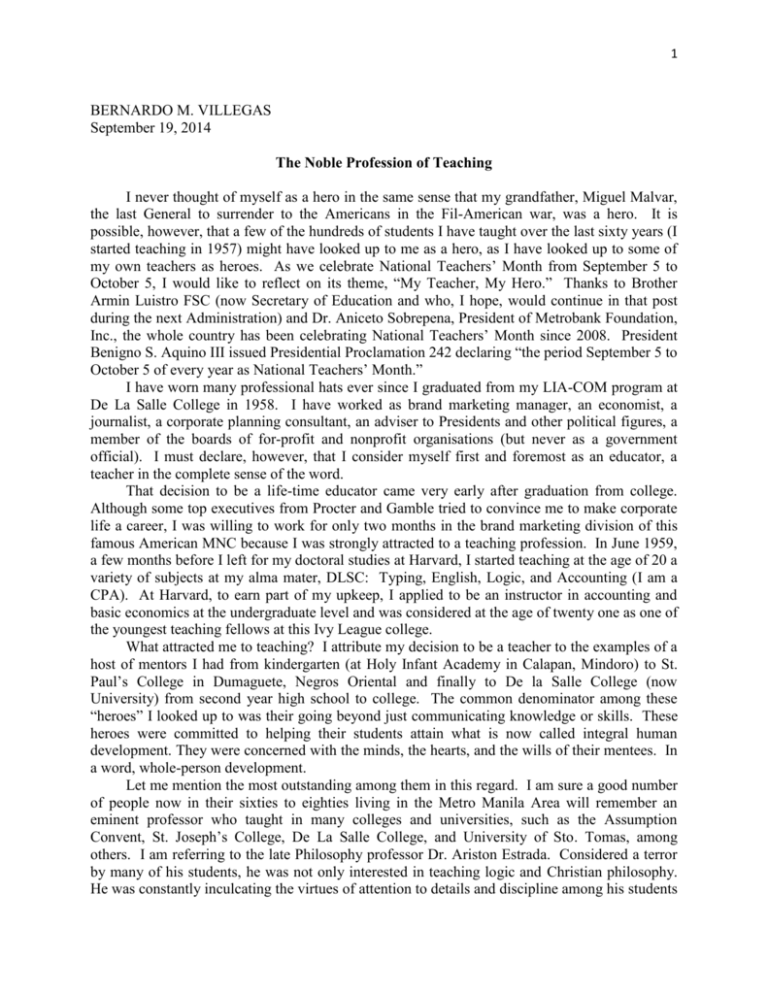
1 BERNARDO M. VILLEGAS September 19, 2014 The Noble Profession of Teaching I never thought of myself as a hero in the same sense that my grandfather, Miguel Malvar, the last General to surrender to the Americans in the Fil-American war, was a hero. It is possible, however, that a few of the hundreds of students I have taught over the last sixty years (I started teaching in 1957) might have looked up to me as a hero, as I have looked up to some of my own teachers as heroes. As we celebrate National Teachers’ Month from September 5 to October 5, I would like to reflect on its theme, “My Teacher, My Hero.” Thanks to Brother Armin Luistro FSC (now Secretary of Education and who, I hope, would continue in that post during the next Administration) and Dr. Aniceto Sobrepena, President of Metrobank Foundation, Inc., the whole country has been celebrating National Teachers’ Month since 2008. President Benigno S. Aquino III issued Presidential Proclamation 242 declaring “the period September 5 to October 5 of every year as National Teachers’ Month.” I have worn many professional hats ever since I graduated from my LIA-COM program at De La Salle College in 1958. I have worked as brand marketing manager, an economist, a journalist, a corporate planning consultant, an adviser to Presidents and other political figures, a member of the boards of for-profit and nonprofit organisations (but never as a government official). I must declare, however, that I consider myself first and foremost as an educator, a teacher in the complete sense of the word. That decision to be a life-time educator came very early after graduation from college. Although some top executives from Procter and Gamble tried to convince me to make corporate life a career, I was willing to work for only two months in the brand marketing division of this famous American MNC because I was strongly attracted to a teaching profession. In June 1959, a few months before I left for my doctoral studies at Harvard, I started teaching at the age of 20 a variety of subjects at my alma mater, DLSC: Typing, English, Logic, and Accounting (I am a CPA). At Harvard, to earn part of my upkeep, I applied to be an instructor in accounting and basic economics at the undergraduate level and was considered at the age of twenty one as one of the youngest teaching fellows at this Ivy League college. What attracted me to teaching? I attribute my decision to be a teacher to the examples of a host of mentors I had from kindergarten (at Holy Infant Academy in Calapan, Mindoro) to St. Paul’s College in Dumaguete, Negros Oriental and finally to De la Salle College (now University) from second year high school to college. The common denominator among these “heroes” I looked up to was their going beyond just communicating knowledge or skills. These heroes were committed to helping their students attain what is now called integral human development. They were concerned with the minds, the hearts, and the wills of their mentees. In a word, whole-person development. Let me mention the most outstanding among them in this regard. I am sure a good number of people now in their sixties to eighties living in the Metro Manila Area will remember an eminent professor who taught in many colleges and universities, such as the Assumption Convent, St. Joseph’s College, De La Salle College, and University of Sto. Tomas, among others. I am referring to the late Philosophy professor Dr. Ariston Estrada. Considered a terror by many of his students, he was not only interested in teaching logic and Christian philosophy. He was constantly inculcating the virtues of attention to details and discipline among his students 2 in the way he corrected papers, gave grades, and monitored recitation. He never tolerated misspellings, mispronunciations, errors in grammar and syntax, etc. He would even suggest to the typical soft-voiced, timid reciter to go to the beach and shout his or her head off to increase the volume of the voice. He would invite his students to “study clubs” to widen their culture and multidisciplinary interests. He would even give advice to love-struck La Salle students pining over some beauty from the Assumption Convent on Herran St. I never forgot how Dr. Estrada would define education, following Christian social teachings, as “preparing a person for what he must be and do on earth so that he can attain the sublime end for which he was created.” He was uncompromising in giving this strict definition of education. He would antagonise some professors from the state university when he would say that, since they were not considering the ultimate end of man in their work in the classroom, they could not be called “educators.” They were simply instructors. Thus, those who would take his definition literally would agree with him that any university, state or private, that does not consider the spiritual end of man cannot be called an “educational institution.” He might not have gotten any award in diplomacy or tactness, but he could never be accused of logical inconsistency. I am glad to report that even in a “Godless” institution like Harvard, I worked with many educators who always took into account the moral dimension of their students by going beyond technical instruction. In the famous tutorial system to which I belonged as a tutor, we were expected to help each student address intellectual goals as well as character or virtues formation. I am also proud of the fact that every educational undertaking in which I have been involved since my return to the Philippines in 1964, education has always been defined in the strict sense given by Dr. Estrada. At CRC, then University of Asia and the Pacific ((UA&P), and in other educational initiatives I have helped to organise (the schools of the Parents for Education Foundation and Dualtech Foundation), the task taken upon themselves by the teachers has always involved whole-person formation or the integral human formation of the students. Despite the higher financial and manpower costs, each student is assigned a mentor who helps his mentee mature into a free and responsible adult. Yes, teachers can only be considered “heroes” if they take seriously the responsibility to help the parents of their students to bring up the youth of today to become technically or professional competent individuals who have the moral integrity to be the leaders or followers of the Philippines of tomorrow. For comments, my email address is bernardo.villegas@uap.asia.
